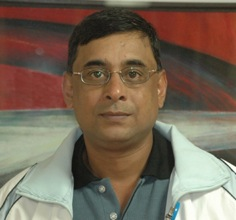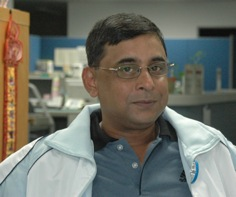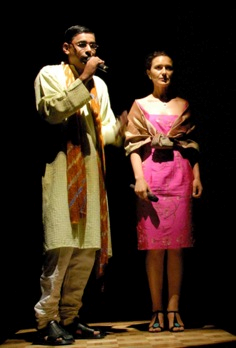 Saurabh Kumar, India
Saurabh Kumar, India
Secretary, Bureau of Energy Efficiency, Ministry of Power
Young Leaders Program (’05/’06)
An Electrical Engineer from the Indian Institute of Technology (IIT) Kanpur, Saurabh briefly joined the Telecom sector in 1989. In 1992, he got selected in the Indian Revenue Service as Assistant Commissioner of Income Tax and, after training in the National Academy of Direct Taxes Nagpur, he was posted in New Delhi. From 1992 until 2002, Saurabh worked as Deputy Commissioner in various sensitive intelligence assignments. In the year 1996-97, he was appointed as first officer of the tax department in India to levy tax on national political parties. He also worked in the enforcement wing of the Revenue Department and conducted search and seizure operations against tax evaders. As part of this job, he conducted one of the biggest anti-tax evasion search operation covering 30 cities and over 15 premises on a large industrial group of India which remains one of the most successful operations in the Department.
In 2002, Saurabh joined the Union Ministry of Power, Government of India as Deputy Secretary in charge of the Budget and Finance wing with the task of appraising large power projects for government investments. He was part of the government structure that was responsible for taking investment decisions in large power projects. The yearly investment budget handled during 2002-2005 was to the tune of USD 4 billion.
On the completion of the GRIPS Young Leaders Program in 2006, Saurabh was appointed as Secretary of the Bureau of Energy Efficiency (BEE), the nodal central body for promoting energy efficiency in India under the Ministry of Power. His present job deals with design and implementation of programmes for promoting energy efficiency in India, preparing policies for enhancing the off-take of energy efficiency and is actively handling the international climate change negotiations as a part of the national negotiation team.
BEE is also the core agency for the implementation of the National Mission on Enhanced Energy Efficiency. One of the key projects currently being implemented is one of the world’s largest CDM (Clean Development Mechanism) based efficient lighting project. Saurabh is also in charge of several bilateral projects on energy efficiency with Japan, Germany, France, etc.
While being a student at GRIPS, Saurabh was always full of energy and creative ideas. Among others, he initiated the “GRIPS Tribune”, a student newsletter that is still being published today. Saurabh was also one of the main organizers of the GRIPS OSCARS, a big and hugely succesful multi-cultural and awards event held at the end of the academic year 05/06. Since his graduation, Saurabh has been very active in supporting and organising GRIPS alumni activities in India.
What is your area of specialization and how did you come to work in this area?
The area of specialization is administering public policy. I completed my graduation in Electrical Engineering and then joined the India Revenue Service (IRS). The major motivation to work for the government for me was to improve and innovate public policy delivery systems to redistribute the fruits of growth to a wider range of citizens which is very relevant for as a large developing country like India. I decided to switch my career from being an Electrical Engineer to being a public servant that I am today.
What are some of the biggest challenges you face in your work and what has been the most rewarding aspect of your career thus far?
Challenges and rewards, to me are two sides of the same coin – I have loved challenges in my career at all times and feel that if there were none- my career would not be interesting enough for me to carry on for 16 years that I have. Therefore, it is difficult for me to pick any one- but I can surely rate something that happened in 1997, when I was a ‘kid’ in government service, fairly high. Being an IRS officer, my job was to collect taxes form all under my jurisdiction. Being only my 3rd year in government, I did not realize that all the national political parties are also under me – which included the party in power as well as the main opposition party. On scrutinizing the tax returns of the main party supporting the Prime Minister (Indian National Congress – which is like the LDP of Japan), I found that they are required to pay tax. This created uproar in the government, not because of the amount of money that I was going to demand them to pay but because of the negative public opinion of the party in power committing a tax offence. My draft orders were got checked for legal and factual correctness and (obviously) no less a person than the then Finance Minister (incidentally the same person is the current FM at present) was reviewing it. It was a tough 3 months period – I refused to do anything that was not fair and legal even if it meant that we tax the party in question. Being the party on whose support the Prime Minister and his government survived, it obviously was not interested in logic- the public shame was far greater prospect that they wanted to avoid than to listen to reason. Fortunately, I was allowed to have my say- but before I could pass the tax demand order, the party withdrew support and the Prime Minister had to resign. In his speech in April, 1997 in Parliament, he spent the first part of his speech in Parliament narrating the entire incident to tell the country why the party suddenly choose to withdraw support to the ruling government and bring it down. The speech is available in the parliament archives. Needless to add, the kind of pressures on me to act in a particular manner were immense- I was glad that I came out of it unscathed – the reward was a recognition – with press and media showering praise on the courage of a young officer. Was great!!
During your career in the Indian Civil Service, what achievement(s) are you most proud of?
I have been extremely satisfied with the way I was allowed to work and improve the delivery systems in whichever area I worked. I have tried to approach each assignment with a fresh outlook without usually following the business as usual approach. I have been, in each one of my assignments till now (there have been almost 10 till now!), able to significantly improve the outputs and outcomes. This has not just been recognized by the superiors but in most cases by the public. There have been many instances where the public has responded by appreciating the transparency, responsiveness and professionalism in the office that I have had the privilege to serve till now.
How did your experience at GRIPS inform your career?
One of the best things that happened to me till now was GRIPS. I joined GRIPS after 13 years of service. Just like an engine which runs for 10 hours a day for 6 days a week for 13 years- I was on the verge of intellectual stagnation. The thought process was getting set within the world that was available to me. Then came the intellectual Oasis- GRIPS that provoked, stimulated and rekindled the intellect- made one introspect on things one has done- evaluate if it could have been done better. The inputs, insights, reading, assignments and the experience of interacting with so many different cultures at the same place and time, made me a different man mentally. One had seen the wonderful growth case studies of nations, particularly Japan- the year in GRIPS showed me just why investment in intellectual capital is the key. Capital and Labour have their own limitation- but intellectual innovation in public policy arena is perhaps one of the most significant things that can mould the path of a nation. GRIPS helped me unravel this- may be a common thing for many in GRIPS but remember- common sense is most uncommon in the world.

What was the most important thing you learned while here?
I had read a clique of a soothsayer in school –
A reasonable man moulds himself to the world
An unreasonable man moulds the world to himself
Progress in the world in mostly due to the unreasonable man.
I always believed that this is just another lesson that a young kid is taught – but never realized the prowess of being unreasonable- to analyse, to review how things are done, to honestly evaluate the processes – the most important tool of best practices being given by GRIPS- one realized the value in being ‘unreasonable’ in work (in a positive sense of the clique). The experience of practically half of the world physically in terms of the colleagues and the wonderful inputs by the faculty showed the way that you may not reinvent the wheel- there are learning in successful design and implementation of public policy- one has to become ‘unreasonable’ armed with a fresh intellect to do things differently in my work. This was one of the most important and memorable thing that I learned. The other thing that is closely related, though not a preserve of GRIPS but something that is striking of Japan- discipline in whatever one must does and dignity of labour.
You are currently heading the government’s Bureau of Energy Efficiency. With soaring oil prices and increasing concerns over climate change, energy efficiency is a top priority of governments around the world these days. India, being a huge and quickly industrializing country is facing a formidable task. What do you see as the main challenges for India over the course of the next five to ten years?
First of all I wish to put the facts right- I am not heading the Bureau of Energy Efficiency (BEE)- I work as Secretary as second in command in the BEE. BEE is a statutory body constituted by the Government of India and is under the administrative control of Ministry of Power. BEE is the apex policy and regulatory body for energy efficiency policy and energy conservation in India. For more details of what we do, please do visit our website www.bee-india.nic.in. We have an extremely challenging task ahead of us. India is a developing country with one of the lowest per capita income and energy consumption in the world. We consume 1/20th of energy per capita s compared to USA, 1/8th that of Japan and Germany and almost 1/4th of the world average. More that 48% of the 1 billion citizens do not have access to commercial energy as yet. Energy prices are becoming a barrier in improving the access of commercial energy in villages and towns of India. Affordability of energy is a huge issue- the cost of energy as a factor of per capita income in India is almost 5 times the OECD average and is going to worsen given the rising oil prices.
Given this background there is no alternative for a democratic government of a welfare state to accelerate the availability of energy. Use of fossil fuel cannot be avoided given the fact that prices of gas are unreasonably high for an oil importing country like India and the access to nuclear energy is still limited. However, India, as a responsible nation, realizes the fact that unlimited CO2e (carbon dioxide and equivalent) emissions in the atmosphere cannot sustain this earth – it is irrespective of the location of the emission. Thus, India has to strike a genuine balance between the genuine demands of its citizens, the high energy prices as well as the effects of profligacy in energy use in its growth model and to attain energy security. Energy efficiency is the obvious first choice from the public policy perspective that addresses all the three issues without affecting the growth. India has been able to sustain the high growth rate during the last decade while reducing the overall energy intensity of the economy- obviously energy efficiency has been a key driver. However, the fact that emission from India will increase- not because of profligacy of higher incomes- but because of providing a lifeline commercial energy to all its citizens. The task given to the policy planners by the Prime Minister of India is in form of a commitment to the world during last year’s G-8 summit- India will never exceed the world average per capita consumption of energy. This is the biggest challenge that India will face in the next 5-10 years.
Did the, perhaps more lucrative, private sector ever hold any appeal for you?
To be honest- if I say no it will not be correct. I am not an unreasonable man in this respect. The private sector did attract me at the time when I completed my graduation. The institute that I went to was rated number 5 in the world in Engineering and most of the students (more than 90%) went for greener pastures in the western world- particularly USA. Having decided to be in Government- more by chance than by choice- I realized the satisfaction of working for it- money is perhaps not the only thing that one looks for- anyway for Indian conditions, Government is a decent employer anyway. Having said that, I reiterate that I am still not an unreasonable man and who knows what the future begets. There is no harm to stay positive and think afresh of an opportunity presents itself- this is part of the intellectual freedom that I talked about which I got from GRIPS.
 If you could choose another profession to be in, what would it be?
If you could choose another profession to be in, what would it be?
To be frank, never really thought about it- but there are many aspirations that most of us have. If I had not been what I am today and I had a choice – I would have possibly tried to be an author- I love writing and expressing my thoughts as I think that it is one of the most creative invention of God given to mankind. Well- the career is not over yet – I am still living with this dream which I hope to fulfill one day.
What is your fondest memory of your time spent at GRIPS/GSPS?
Not a very hard one to pick- the GRIPS Tribune and OSCARS. The entire process associated with it, the challenge that similar newsletters never survived in the past and the hours of work that I and Roman put in to make OSCARS happen. The tumultuous response that the two creative things received, the way they helped us rediscover friendships and the bonding that we achieved with all the faculty, management as well as the staff was something that I could never forget. I remember a very famous line of William Wordsworth- (I have changed it to express my fondest memory)
For oft when on my couch I lie,
In vacant or in pensive mood
GRIPS OSCARS flash upon my inward eye,
Which is bliss of solitude
And then my heart with pleasure fills,
And dances with the KAJRA RE Girls.
(For the benefit of non-2005 class, KAJRA RE was the cynosure of all dances performed by YLP during GRIPS OSCARS- wish Karin uploads the video some day!)
What do you miss about Japan?
GRIPS- the wonderful people that made our stay and study an irremovable etch in our memory. The carelessness of being student, the comfort of being preserved in a foreign land in a beautiful paradise at Odaiba, the wonderful colleagues from around the globe, the simplicity and honesty of interactions, the scenic and poetic environs of Japan countryside, the displace in the common man, the punctuality, responsiveness…. Well I can go on and on- this is one of the best things that happened to me and my family till now- yes we do miss each and every moment that we lived in Japan.
What is your favorite thing to do when you are not working?
I love playing sports- tennis and cricket (is like football in India- a religion!), listening to music and of course writing. I usually do all this in the cosy environs of my family. Yes- I also love to cook- the guests are invited but at their own risk!!
How do you maintain a balance between your work and the rest of your life?
To be frank- this is one of the hardest thing for me to do- work to me is a religion- bringing up my children is also the same. I try to spend as much time as possible on weekends and holidays with then- we play games together, go out for dinners and holidays. We are also very social- love calling people over for dinner.
What advice would you give to current GRIPS students?
This is the best thing that has happened to you – savour every moment of it. Make as many friends as possible- do not miss the chance to learn by experience, by understanding different cultures, by realizing the wealth on offer in GRIPS and in Japan. Time never comes back, friends will not meet again together in your lifetime- this is a special period God has bestowed on you- enjoy every moment of it. Once again I will twist a very famous advertisement of an international product to underscore what I mean-
There are many things Yen can buy you in Japan
But for everything else, there is GRIPS





